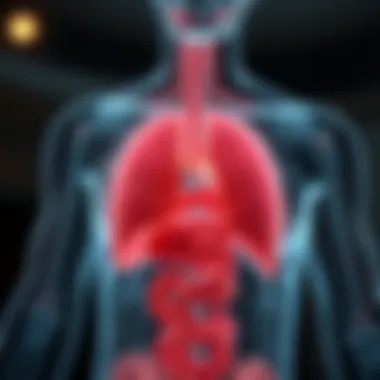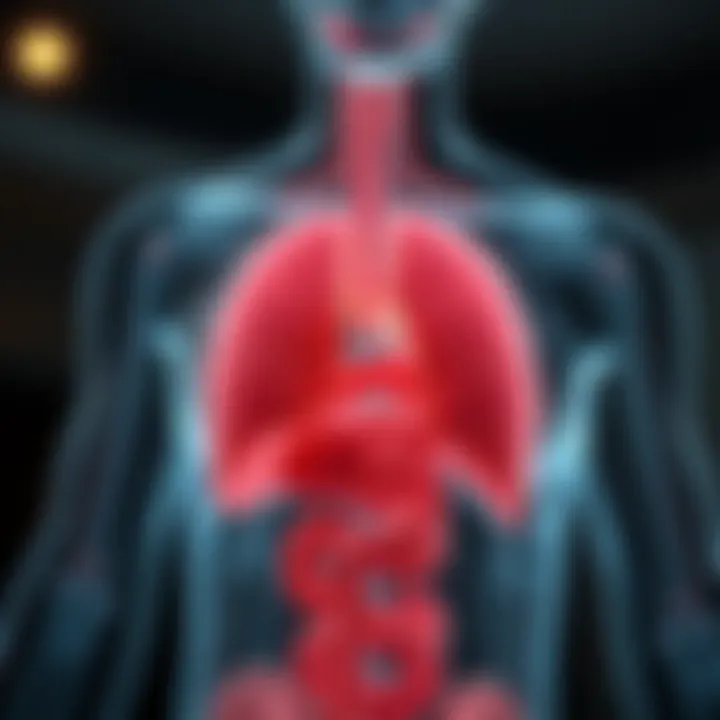Exploring Weight Loss and Its Impact on Acid Reflux


Intro
Acid reflux, or gastroesophageal reflux disease (GERD), is a condition that may affect individuals of all ages, leading to painful and uncomfortable symptoms, such as heartburn and regurgitation. One notable aspect of this condition is its intriguing relationship with weight management. Many people may not realize that shedding excess pounds could potentially reduce the frequency and intensity of reflux episodes. Unpacking this connection can shed light on practical lifestyle adjustments that could improve patient outcomes.
Understanding how weight loss interacts with acid reflux symptoms is essential for a healthier tomorrow. In the upcoming sections, we will dive deeper into the physiological mechanisms, discuss relevant research, and explore evidence-based strategies that illustrate the weight loss-acid reflux nexus. This exploration not only serves those suffering from reflux but also equips healthcare providers with a broader understanding of the implications for treatment and management.
Understanding Acid Reflux
Acid reflux is a common yet often misunderstood condition that can significantly impact one's quality of life. By delving into the intricacies of this ailment, we can better grasp how it relates to various external factors, particularly weight. Understanding the dynamics at play in acid reflux not only sharpens one’s awareness but also serves as a foundation for exploring effective interventions, including weight loss. Knowing the nuances can help individuals tailor their approaches to managing their symptoms and improving their overall health.
Defining Acid Reflux
To comprehend the potential connection between weight and acid reflux, one must first define what acid reflux entails. It occurs when stomach acid backs up into the esophagus, causing a burning sensation often referred to as heartburn. This backflow can lead to irritation of the esophageal lining, resulting in various discomforts that can range from mild to severe.
In simple terms, acid reflux is like having a malfunctioning valve that allows the contents of the stomach to creep back up when they shouldn't. Many people experience it infrequently, but for some, it can morph into Gastroesophageal Reflux Disease (GERD), a more serious condition.
Symptoms and Diagnosis
The array of symptoms tied to acid reflux can vary immensely. Common complaints include:
- Heartburn
- Regurgitation of food or sour liquid
- Difficulty swallowing
- Sore throat
These symptoms often lead individuals to seek medical advice, prompting a diagnosis. Healthcare professionals typically employ a variety of strategies to diagnose this condition. Patient history plays a crucial role; doctors will inquire about the frequency and intensity of symptoms. In some cases, tests such as an upper gastrointestinal series or endoscopy might be performed to visualize the esophagus and stomach.
Recognizing these symptoms and understanding your own body responses is essential for proper diagnosis and effective management.
Causes of Acid Reflux
Several factors can contribute to the development of acid reflux. Recognizing these causes can help in mitigating the symptoms and might indicate the importance of weight management. Some common culprits include:
- Obesity: Excess body weight, particularly around the abdomen, can exert pressure on the stomach, making reflux more likely.
- Dietary Choices: Certain foods like spicy dishes, citrus fruits, and caffeine can trigger symptoms.
- Lifestyle Factors: Smoking and alcohol consumption are known to exacerbate the condition.
- Pregnancy: Hormonal changes and added pressure on the abdomen during pregnancy can lead to increased reflux.
These elements play into the larger narrative of managing acid reflux, often pointing to the interconnectedness of physical wellness and dietary habits. By acknowledging these causes, particularly the role of obesity, individuals can make informed choices that may alleviate the severity of their symptoms.
"Understanding the structure of acid reflux not only empowers individuals to manage their symptoms but also prompts a broader awareness of how lifestyle choices, including weight, mold the landscape of their health."
Through a deeper understanding of acid reflux, readers will find themselves better equipped to navigate their journey toward achieving a healthy weight and enhancing overall well-being.
The Role of Weight in Acid Reflux
Understanding the role of weight in acid reflux is crucial, as there exists a significant correlation between excess pounds and the severity of reflux symptoms. Many individuals recognize that living with acid reflux can be an uncomfortable ordeal, often leading to lifestyle changes that complicate personal well-being. Weight can be a double-edged sword in this context; while losing weight tends to alleviate symptoms, carrying extra weight may exacerbate the condition. This article delves into how shedding pounds might mitigate the discomfort associated with acid reflux, along with exploring various pathways through which this connection operates.
Obesity and Increased Risk
Obesity stands tall as a considerable risk factor for acid reflux. When a person is overweight, the body's mass significantly contributes to increased intra-abdominal pressure. This excess pressure can push stomach contents, including acid, upward into the esophagus, culminating in reflux. The higher the body mass index (BMI), the more likely individuals are to experience reflux symptoms. Consequently, significant weight gain can serve as a precursor to more severe outbreaks of gastroesophageal reflux disease (GERD). Rather starkly, studies suggest that even modest weight reductions can result in improved symptoms and lower reliance on medications.
Mechanisms Linking Weight and Reflux
Abdominal Pressure


Abdominal pressure forms a central theme in the dialogue around weight and acid reflux. The extra fat in the abdominal area tends to create a scenario where the stomach experiences heightened pressure. This pressure can overwhelm barriers meant to keep stomach contents at bay, resulting in heartburn and discomfort. One key characteristic of increased abdominal pressure is its ability to alter the dynamics of digestion. With increased weight, it's less likely for the lower esophageal sphincter—the crucial muscle at the entrance of the stomach—to function effectively, leading to a greater likelihood of acid escaping into the esophagus, and thereby causing reflux.
Lower Esophageal Sphincter Function
Another noteworthy connection between weight and reflux relates to the function of the lower esophageal sphincter (LES). The LES acts as a barrier, preventing stomach acid from entering the esophagus. However, added weight can reduce the efficiency of this sphincter. When the muscle weakens, the body loses an important defense mechanism against acid reflux. Observing this, one can see why understanding this relationship is vital. If the sphincter is under constant duress from excess weight, it may not perform optimally. This dysfunction creates a vicious cycle, where weight gain contributes to reflux, which in turn may lead to weight gain due to dietary changes aimed at managing symptoms and avoiding discomfort.
Demographic Factors
Demographic factors such as age and gender also play a role in how weight relates to acid reflux. Different age groups may respond variously to weight changes, making it pertinent to consider age when addressing reflux issues.
Age
Age certainly influences the risk of experiencing acid reflux. As individuals age, their bodily functions undergo natural changes, including the strength of the lower esophageal sphincter. This change can be exacerbated in older adults with a higher propensity for obesity, further inflating the risk of reflux. Moreover, older adults may generally experience a slowed metabolism, which can make weight loss especially challenging. This can become a significant factor in symptom management, as the link between weight and reflux might get more pronounced with age.
Gender
Gender differences come into play, with studies indicating that men tend to have a higher correlation between obesity and acid reflux symptoms compared to women. This can stem from differing body fat distribution patterns. Men typically carry more abdominal fat, which correlates directly with increased risk factors for reflux. On the other hand, women may experience reflux for hormonal reasons, particularly around menstruation and menopause.
Understanding these demographic factors allows researchers and practitioners to tailor advice on weight management and reflux remedies, potentially steering individuals toward healthier outcomes more effectively.
"Weight management is more than a numbers game; it's about understanding your body and its nuances, particularly when it comes to fighting acid reflux."
With these insights, we glean a more in-depth understanding of how weight interacts with acid reflux. The next segments will explore not only the implications of weight loss but also the strategies that can assist individuals in managing this common yet often uncomfortable condition.
Weight Loss and Its Effects
Understanding the relationship between weight loss and acid reflux is essential for those who grapple with this condition. Weight loss can lead not only to a reduction in symptoms but also to an improvement in overall health. As many individuals might attest, shedding those extra pounds often brings about a myriad of benefits that extend beyond just alleviating reflux. This makes it imperative to explore how weight management strategies can play a pivotal role in managing acid reflux.
Clinical Evidence
Studies on Weight Loss Outcomes
Research shows a direct correlation between weight loss and the mitigation of acid reflux symptoms. Various studies highlight that patients who lose weight often experience a remarkable decrease in both the frequency and severity of reflux episodes. One primary characteristic worth noting is that these studies typically involve diverse populations, showcasing the effectiveness of weight loss strategies across different demographic segments. A notable experiment conducted at Harvard University found that participants who lost an average of 10% of their body weight reported significantly fewer acid reflux incidents than their heavier counterparts.
The unique feature of these studies is the comprehensive approach they take, often combining behavioral changes, dietary modifications, and physical activity. This multidimensional aspect provides a rich understanding of how losing weight can can lead to improved health outcomes. However, some might argue that individual results can vary widely based on personal habits and underlying health conditions, making it crucial to tailor weight loss plans to fit individual needs.
Comparative Analysis of Treatments
When evaluating treatment options for acid reflux, conducting a comparative analysis can yield informative insights. This involves examining the efficacy of weight loss against other common interventions, such as proton pump inhibitors or antacids. One key characteristic is that weight loss is often regarded as a long-term solution, unlike medications that might offer only temporary relief.
A unique feature of this analysis is its detailed exploration of patient adherence to weight loss regimens versus medication. Studies show that while medications might provide quick fixes, lifestyle changes require ongoing commitment. Yet, many patients find that they are more inclined to stick to a weight loss plan once they start witnessing tangible benefits. Nonetheless, integrating weight loss strategies with pharmacologic treatments might yield better results for some, demonstrating the complexity of managing acid reflux effectively.
Weight Loss Strategies
Dietary Changes
Diving into dietary changes, it’s essential to recognize how they can significantly impact acid reflux management. Individuals looking to lose weight often find that altering their eating habits translates not just to weight reduction but also to alleviating symptoms. The heart of this lies in certain foods that trigger acid reflux episodes.
One of the most beneficial aspects of dietary changes is the emphasis on whole foods and balanced meals, such as vegetables, lean proteins, and healthy fats. A unique feature of this approach is that it often leads to a higher intake of nutrients, which can contribute to better overall health. Moreover, keeping a food diary can help individuals identify specific triggers that exacerbate their symptoms, allowing for more tailored dietary adjustments. However, some may face challenges in fully committing to these changes, particularly if they lead a busy lifestyle or have ingrained eating habits.
Exercise Regimens


When discussing weight loss strategies, it’s hard to overlook the role of exercise. Engaging in regular physical activity not only aids weight management but can also improve esophageal function. One notable characteristic of effective exercise regimens is that they can range from high-intensity workouts to leisurely walks, catering to various fitness levels and preferences.
The unique advantage of adopting an exercise routine is the dual benefit it offers—helping in weight loss while simultaneously bolstering gastrointestinal health. Even a modest uptick in physical activity has been shown to enhance metabolic function, providing additional wellness benefits. However, caution is warranted, as certain intense workouts may exacerbate acid reflux for some. Finding the right balance between exercise intensity and personal comfort can be essential in maximizing benefits without triggering symptoms.
Ultimately, pinpointing effective weight loss strategies is vital for individuals managing acid reflux. It highlights a pathway to potentially ease symptoms—providing relief not just physically but also enhancing overall quality of life.
Lifestyle Modifications Beyond Weight Loss
Addressing weight loss is often regarded as a key strategy in managing acid reflux. However, the journey doesn’t stop there. It’s essential to explore lifestyle modifications that can further alleviate symptoms and enhance quality of life. These changes not only complement weight management but can significantly impact overall health and well-being. Finding the right balance between what we eat, how we act, and the choices we make in our daily lives plays a crucial role in symptom management.
Dietary Considerations
Avoiding Trigger Foods
One of the fundamental aspects of managing acid reflux is identifying and avoiding trigger foods. These culprits can provoke gastric discomfort and increase acid production, leading to a flare-up of symptoms. Common offenders include spicy meals, citrus fruits, chocolate, and fried foods. By steering clear of these delights, individuals can potentially reduce the frequency and severity of their reflux episodes.
What makes avoiding trigger foods an appealing choice is the personalized approach it allows. Every person's body responds differently to various foods; hence, creating a tailored dietary plan can empower individuals to take charge of their health. Moreover, this consideration fosters a deeper understanding of one's own body's signals, leading to more mindful eating habits. It is advantageous to keep a food journal for monitoring reactions to certain foods.
However, a downside is that cutting out beloved snacks might feel daunting, and it may take time to figure out what works best. But perseverance ultimately pays off in terms of comfort and satisfaction.
Meal Timing and Portions
The timing and portion sizes of meals also hold weight in managing reflux symptoms. Eating smaller, more frequent meals rather than the classic three large meals a day can ease the digestive burden. This approach can lessen the pressure on the stomach and lower the risk of acid backflow.
Meal timing, too, is key. Ideally, individuals should refrain from eating within a few hours of bedtime. This practice can reduce nocturnal reflux incidents by giving the body ample time to digest. Eating early in the evening and sticking to lighter meals can be a winning strategy that aligns with one's biological rhythms.
Yet, there's a flip side. Busy lifestyles can make it challenging to commit to these practices consistently. It takes effort and commitment to alter eating habits, and quick on-the-go snacks often tempt individuals. Nonetheless, prioritizing meal patterns not only benefits digestive health but also fosters a more balanced and mindful approach to eating.
Sleep Positions
Sleep positions can surprisingly influence the severity of acid reflux symptoms. Lying flat on one’s back may exacerbate reflux issues, while a slight elevation of the upper body can help keep acids in the stomach. Using a wedge pillow or adjusting the head of the bed can be practical solutions that create a more favorable sleeping environment. These minor adjustments might require trial and error to find what’s most comfortable but can lead to substantial relief over time.
Smoking and Alcohol Consumption
Tobacco use and alcohol intake are additional factors that can derail progress in managing acid reflux. Smoking can decrease the efficacy of the lower esophageal sphincter, leading to increased risk of reflux. Likewise, excessive alcohol can exacerbate symptoms by increasing stomach acidity. Reducing or quitting both substances can enhance overall health and significantly contribute to managing acid reflux symptoms.
In summary, while losing weight is undoubtedly beneficial, incorporating these lifestyle modifications can set the stage for a more comprehensive approach to managing acid reflux. When food choices, eating habits, sleep positions, and substance use align for better health, individuals are better equipped to tackle the challenges posed by this common condition.
"Small, consistent changes in your lifestyle pave the way for lasting improvements in your health."
For further reading, check out resources on diet and lifestyle from MedlinePlus and Mayo Clinic.
Medical Interventions and Weight Management
Understanding the interplay between medical interventions and weight management is crucial when addressing acid reflux. The impact of excess weight on the severity of reflux symptoms cannot be understated. Here, we focus on the key role that medications and surgical options play in not only managing acid reflux itself but also facilitating weight loss in some patients.
Effective interventions can help reduce the burden of symptoms while also providing an opportunity for individuals to improve their overall health outcomes. Moreover, a combination of medication and surgical procedures can target the root causes of acid reflux, which often are exacerbated by weight issues. By considering this holistic approach, patients can look forward to a marked decrease in discomfort as they embark on their weight loss journey.
Medications for Acid Reflux
Pharmaceutical options abound when it comes to treating acid reflux. These medications vary widely in action and purpose, serving as valuable tools for both symptomatic relief and long-term management.


- Antacids are often the first line of defense, neutralizing stomach acid quickly. They can provide prompt relief, but are not always a long-term solution as they may not address the underlying factors contributing to reflux.
- -receptor antagonists, like ranitidine, work by reducing stomach acid production. Their effect is longer-lasting than antacids but may require a prescription for higher doses.
- Proton pump inhibitors (PPIs), including omeprazole, are effective for chronic issues. They greatly decrease acid production and can lead to significant improvement in overall reflux symptoms.
However, these medications are not without their downsides. Long-term use has been associated with various side effects, and some individuals may be wary of dependency on these drugs. Weight loss can also be aided indirectly; as individuals start to shed pounds, they may find their medication needs decrease, allowing them to taper off certain medications altogether.
Surgical Options
For some patients, lifestyle changes and medications simply do not cut it, leaving surgery as the next viable option. Surgery may be recommended when reflux becomes severe or when complications arise. Below, we explore two common surgical interventions: Fundoplication and Weight Loss Surgery.
Fundoplication
Fundoplication surgery involves wrapping the top of the stomach around the lower esophagus to prevent acid from backing up. This surgery can be a game changer for individuals suffering from severe reflux that doesn't respond to other treatments. Its key characteristic lies in its ability to strengthen the lower esophageal sphincter.
Patients often find that this procedure is effective at reducing or even eliminating symptoms of acid reflux, offering a sense of freedom from the discomfort. However, recovery can be somewhat slow, and as with any surgical procedure, there are risks involved including infection or complications associated with anesthesia. It's not a small matter, but for those who find themselves at their wits' end, it may be a solid decision.
Weight Loss Surgery
For many, weight loss surgery can be the starting line for a healthier life, especially in the context of combating acid reflux. Procedures such as gastric bypass or sleeve gastrectomy significantly reduce stomach capacity and, in turn, lessen the likelihood of reflux. The key aspect of weight loss surgery is that it not only tackles obesity but directly contributes to resolving acid reflux symptoms.
While this surgery can lead to rapid weight loss and improved quality of life, it comes with its unique risks including nutritional deficiencies and surgical complications. Patients must weigh these risks against the potential benefits thoroughly. Often, a multidisciplinary approach involving consultations with a dietitian, gastroenterologist, and surgeon is best to ensure a successful outcome.
Ultimately, surgical options, while effective, are not guaranteed fixes and should be considered carefully alongside lifestyle changes.
In summary, medical interventions are vital components in the management of weight-related acid reflux. By utilizing pharmacological strategies and surgical procedures, individuals can find pathways to better health, ultimately alleviating the chronic struggle with symptoms.
Finales and Future Directions
The relationship between weight loss and acid reflux has far-reaching implications for individuals struggling with this condition. In essence, this article aims to highlight not only the connections between the two but also the significant potential benefits that come with weight loss. Reducing weight can alleviate symptoms that often hinder daily life, such as heartburn, regurgitation, and chest pain, making a notable difference in a patient’s quality of life and wellbeing.
From a clinical standpoint, understanding how weight interacts with reflux disease offers a path forward for treatment and management. For instance, as we have explored earlier, there are physiological mechanisms at play, such as decreased abdominal pressure which can ease symptoms considerably. This suggests that healthcare providers should consider weight management as a primary intervention strategy for patients grappling with acid reflux.
Moreover, shedding pounds isn't just about physical health; it can also foster greater emotional and psychological benefits. A lighter body weight often leads to greater mobility and vitality, which in return may empower individuals to adopt more active lifestyles. Such lifestyles naturally promote better dietary choices, which can further enhance reflux management.
It is crucial, however, to acknowledge the nuances involved in this relationship. Different body types and individual health histories play a role in how weight loss impacts reflux symptoms. Therefore, ongoing research that delves deeper into these factors is essential for developing tailored interventions.
Future directions in this field should also include longitudinal studies that assess the long-term outcomes of various weight loss strategies on acid reflux. By digging into how sustained weight loss affects reflux over the years, researchers can fill in the gaps of our current understanding, leading to improved guidelines for treatment.
Additionally, there lies a need for stricter clinical trials focusing on the interplay between lifestyle alterations and pharmaceutical interventions. Finding the sweet spot where weight management, medication, and lifestyle come together could be revolutionary in the treatment of acid reflux.
Summary of Findings
Throughout this article, we've parsed through the complexities tying weight with acid reflux symptoms. Key findings include:
- Losing weight can significantly diminish the frequency and severity of acid reflux symptoms.
- Abdominal pressure plays a direct role in exacerbating reflux symptoms, reducing which can lead to relief.
- Lifestyle changes, including dietary modifications and increased physical activity, serve as effective strategies for weight loss and symptom management.
- The role of age and gender in acid reflux presentations emphasizes a need for tailored treatment plans.
These findings underscore the need for a multi-faceted approach to treat acid reflux, with weight management at the forefront.
Implications for Research
Future research should not just echo existing studies but aim to uncover deeper connections in how various weight loss modalities interact with the complexities of acid reflux. Here are a few important avenues for further investigation:
- Diverse Populations: There is a pressing need to study how different ethnicities respond to weight loss interventions regarding acid reflux. Given that diet and genetics can vary substantially, a broad understanding may aid in creating more inclusive guidelines.
- Integration of New Technologies: The use of wearable tech and mobile apps for real-time data collection on diet and symptoms can enhance our understanding of the relationship between weight and acid reflux.
- Long-term Impact Studies: Observing patients over extended periods after weight loss may illustrate delayed effects or consequences that previous short-term studies might miss.
These considerations paint a broader picture for the academic community and healthcare practitioners alike. The focus should be on adaptive strategies that can evolve with emerging evidence, ultimately tailoring treatment to individual needs and circumstances.
"Understanding the intricate links between weight loss and acid reflux may well open doors to unprecedented avenues in patient care and health enhancement."
As we continue to unravel this connection, the hope remains that a more profound understanding will lead to effective, sustainable solutions for those affected by acid reflux.















